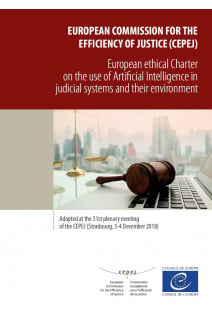



The European Commission for the Efficiency of Justice (Cepej) of the Council of Europe has adopted on 4th December 2018 the first European text setting out ethical principles relating to the use of artificial intelligence (AI) in judicial systems.
The Charter provides a framework of principles that can guide policy makers, legislators and justice professionals when they grapple with the rapid development of Artificial Intelligence in national judicial processes.
The CEPEJ’s view is that the application of Artificial Intelligence in the field of justice can contribute to improve the efficiency and quality. It must be implemented in a responsible manner which complies with the fundamental rights guaranteed in particular in the European Convention on Human Rights (ECHR) and the Council of Europe Convention on the Protection of Personal Data. It is essential to ensure that Artificial Intelligence remains a tool in the service of the general interest and that its use respects individual rights.
The Charter defines five core principles to be respected in the field of Artificial Intelligence and justice: respect of fundamental rights; non-discrimination; quality and security; transparency, impartiality and fairness; “under user control”. The Charter is accompanied by an in-depth study on the use of Artificial Intelligence in judicial systems.
INTRODUCTION
THE FIVE PRINCIPLES OF THE ETHICAL CHARTER ON THE USE OF ARTIFICIAL INTELLIGENCE IN JUDICIAL SYSTEMS AND THEIR ENVIRONMENT
1. Principle of respect for fundamental rights: ensure that the design and implementation of artificial intelligence tools and services are compatible with fundamental rights
2. Principle of non-discrimination: Specifically prevent the development or intensification of any discrimination between individuals or groups of individuals
3. Principle of quality and security: With regard to the processing of judicial decisions and data, use certified sources and intangible data with models conceived in a multi-disciplinary manner, in a secure technological environment
4. Principle of transparency, impartiality and fairness: Make data processing methods accessible and understandable, authorise external audits
5. Principle “under user control”: Preclude a prescriptive approach and ensure that users are informed actors and in control of their choices
APPENDIX I – IN-DEPTH STUDY ON THE USE OF AI IN JUDICIAL SYSTEMS, NOTABLY AI APPLICATIONS PROCESSING JUDICIAL DECISIONS AND DATA
1. State of the use of artificial intelligence algorithms in the judicial systems of Council of Europe member States
2. Overview of open data policies relating to judicial decisions in the judicial systems of Council of Europe member States
3. Operating characteristics of artificial intelligence (machine learning) applied to judicial decisions
4. Can artificial intelligence model legal reasoning in advance?
5. Can AIs explain judges’ behaviour in retrospect?
6. How is AI to be applied in civil, commercial and administrative justice?
7. Issues specific to criminal justice: prevention of offences, risk of recidivism and assessment of the level of danger
8. Specific questions relating to the protection of personal data
9. The potential and limitations of predictive justice tools
10. The need for an in-depth public debate on these tools prior to the implementation of public policies for their development. The urgent need for cyberethics to provide a framework for the development of artificial intelligence algorithms while respecting fundamental rights
APPENDIX II – WHICH USES OF AI IN EUROPEAN JUDICIAL SYSTEMS?
Uses to be encouraged
Possible uses, requiring considerable methodological precautions
Uses to be considered following additional scientific studies
Uses to be considered with the most extreme reservations
APPENDIX III – GLOSSARY
APPENDIX IV – CHECKLIST FOR INTEGRATING THE CHARTER’S PRINCIPLES INTO YOUR PROCESSING METHOD
CHECKLIST FOR EVALUATING YOUR PROCESSING METHODS

The European Commission for the Efficiency of Justice (Cepej) of the Council of Europe has adopted on 4th December 2018 the first European text setting out ethical principles relating to the use of artificial intelligence (AI) in judicial systems.
The Charter provides a framework of principles that can guide policy makers, legislators and justice professionals when they grapple with the rapid development of Artificial Intelligence in national judicial processes.
The CEPEJ’s view is that the application of Artificial Intelligence in the field of justice can contribute to improve the efficiency and quality. It must be implemented in a responsible manner which complies with the fundamental rights guaranteed in particular in the European Convention on Human Rights (ECHR) and the Council of Europe Convention on the Protection of Personal Data. It is essential to ensure that Artificial Intelligence remains a tool in the service of the general interest and that its use respects individual rights.
The Charter defines five core principles to be respected in the field of Artificial Intelligence and justice: respect of fundamental rights; non-discrimination; quality and security; transparency, impartiality and fairness; “under user control”. The Charter is accompanied by an in-depth study on the use of Artificial Intelligence in judicial systems.
Attention, en vertu de nos conditions générales de vente, l'achat des PDF/epub est réservé aux particuliers.
